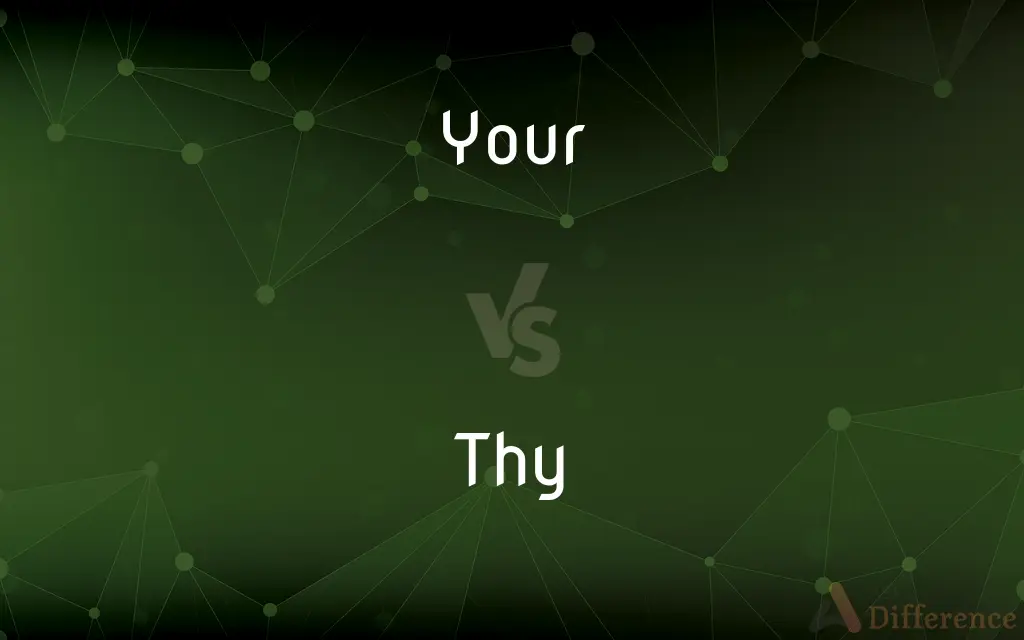Your vs. Thy — What's the Difference?
By Urooj Arif & Maham Liaqat — Updated on April 5, 2024
"Your" is a possessive pronoun in modern English, while "thy" is its archaic counterpart used in old or poetic contexts.

Difference Between Your and Thy
Table of Contents
ADVERTISEMENT
Key Differences
The distinction between "your" and "thy" lies in their usage in the English language across different periods and contexts. "Your" is the second person possessive pronoun used in contemporary English to denote ownership or association to the person being addressed, applicable in both singular and plural forms. On the other hand, "thy" is the archaic form of "your," primarily found in historical texts, literature, and religious scriptures, used before words beginning with a consonant sound.
While "your" is universally recognized and understood in modern English-speaking contexts, "thy" evokes a sense of antiquity, formality, or poetic nuance, often used to add stylistic or thematic depth to literary works or when mimicking historical speech.
The usage of "thy" over "your" can significantly impact the tone and setting of a narrative, suggesting a historical or formal context, whereas "your" is neutral and widely applicable in everyday communication.
Another aspect to consider is the variation "thine," which is akin to "yours" in modern English. "Thy" transforms to "thine" before vowels or vowel sounds for easier pronunciation, similar to how "a" changes to "an." This linguistic adaptation for ease of speech does not have a direct contemporary equivalent in the shift from "your" to "yours," as "yours" remains unchanged regardless of the following word's initial sound.
Understanding the distinction between "your" and "thy" is not only crucial for interpreting historical and literary texts accurately but also enriches one’s appreciation of the English language’s evolution and the stylistic choices of authors across eras.
ADVERTISEMENT
Comparison Chart
Usage
Modern English, both singular and plural forms.
Archaic or poetic English, used before consonant sounds.
Context
Everyday, contemporary communication.
Historical, literary, or formal contexts.
Tone
Neutral, universally applicable.
Old-fashioned, formal, or poetic.
Variation for Vowels
No change, "your" remains.
Changes to "thine" before vowels or vowel sounds.
Example
"Is this your book?"
"Is this thy book?"
Compare with Definitions
Your
Denotes possession or relation to the person addressed.
Your book is on the table.
Thy
Archaic form of "your," indicating possession.
Thy kingdom come, thy will be done.
Your
Neutral in tone.
Your feedback is appreciated.
Thy
Found in historical or poetic contexts.
Thy name is whispered in the hallways of history.
Your
Applicable in both singular and plural situations.
Your ideas are interesting.
Thy
Precedes words starting with a consonant sound.
Thy courage shall not go unnoticed.
Your
Used in contemporary settings.
Your appointment is scheduled for tomorrow.
Thy
Evokes a sense of antiquity or formality.
Thy deeds speak volumes of thy character.
Your
Direct and clear possessive pronoun.
Your phone is ringing.
Thy
Used to add stylistic depth to texts.
Thy love hath given me more than worldly wealth.
Your
Used as a modifier before a noun
Your boots.
Your accomplishments.
Thy
Archaic or dialect form of your
Honour thy father and thy mother
Your
A person's; one's
The light switch is on your right.
Thy
Used as a modifier before a noun.
Your
(Informal) Used with little or no sense of possession to indicate a type familiar to the listener
Your basic three-story frame house.
Thy
Form of Possessive form.
Your
Belonging to you; of you; related to you (singular; one owner).
Let’s meet tomorrow at your convenience.
Is this your cat?
Thy
Of thee, or belonging to thee; the more common form of thine, possessive case of thou; - used always attributively, and chiefly in the solemn or grave style, and in poetry. Thine is used in the predicate; as, the knife is thine. See Thine.
Our father which art in heaven, Hallowed be thy name. Thy kingdom come. Thy will be done.
These are thy glorious works, Parent of good.
Your
Belonging to you; of you; related to you (plural; more owners).
Your
A determiner that conveys familiarity and mutual knowledge of the modified noun.
Not your average Tom, Dick and Harry.
Your Show of Shows
Your World with Neil Cavuto
Not Your Average Travel Guide
Your
(Ireland) That; the specified (usually used with a human referent)
Your man just bought a new car.
Have you seen what your one over there is doing?
Your
The form of the possessive case of the personal pronoun you.
Common Curiosities
Why was "thy" replaced by "your"?
Language evolution made "your" the standard form in modern English for clarity and universality.
What is the main difference between "your" and "thy"?
"Your" is used in modern English, while "thy" is its archaic counterpart.
Does "thy" have a plural form?
No, "thy" is used for both singular and plural forms in its context, similar to "your."
Where is "thy" commonly found?
In historical texts, religious scriptures, and poetry.
Why is understanding "thy" important?
For accurate interpretation of historical and literary works.
Can using "thy" in modern communication be confusing?
Yes, it can be confusing and is generally not recommended outside of specific stylistic choices.
Can "thy" and "your" be used interchangeably?
Not in contemporary speech; "thy" is mostly used for stylistic or thematic effects.
Is "thy" still used today?
Primarily in literary, religious, or historical reenactment contexts.
Are there modern contexts where "thy" is preferred?
Mostly in artistic, religious, or thematic uses where a historical or formal tone is desired.
What is the significance of "thy" in language history?
It illustrates the evolution of language and changes in possessive pronoun usage over time.
How does the use of "thy" affect the tone of a sentence?
It adds an old-fashioned, formal, or poetic nuance.
What is "thine"?
"Thine" is to "thy" as "yours" is to "your," used before vowels or vowel sounds.
How does "thy" influence the readability of a text?
It can make texts feel more archaic or formal.
How can one learn to use "thy" correctly?
By studying historical texts, poetry, and grammar guides that explain its use and context.
Is there a difference in pronunciation between "your" and "thy"?
Yes, there are slight pronunciation differences, reflecting their spelling.
Share Your Discovery

Previous Comparison
Traction vs. Tension
Next Comparison
Fragile vs. VulnerabilityAuthor Spotlight
Written by
Urooj ArifUrooj is a skilled content writer at Ask Difference, known for her exceptional ability to simplify complex topics into engaging and informative content. With a passion for research and a flair for clear, concise writing, she consistently delivers articles that resonate with our diverse audience.
Co-written by
Maham Liaqat















































